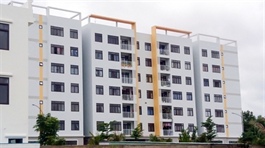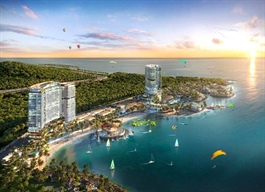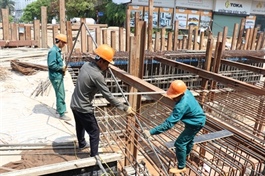Investors wanted for social housing efforts
Investors wanted for social housing efforts
Vietnam plans to mobilise different financial sources from society, especially from enterprises and foreign developers, to offer more social housing.

Speaking at a May 19 conference on plans to develop one million social houses for lower-income people and workers by 2030, Minister of Construction Le Thanh Nghi said that the ministry would coordinate with authorities to ensure it achieved its social housing targets.
The ministry (MoC) has completed the draft amended Law on Housing, which has been approved by the government and submitted to the National Assembly for approval.
It is hoped that the amended law will draw policies for social housing development and take effect from 2024, including planning and reserving land for social housing development, selection of project investors, and procedures for implementation.
As of Q1 2023, Vietnam has completed just over 300 social housing projects in urban areas and worker housing projects in industrial zones (IZs), with nearly 156,000 units in total. About 400 projects are still planned to be built, with a total scale of 454,000 apartments. However, demand has not been fully met.
According to a survey by the MoC, the demand for social housing for low-income workers in IZs is about 2.4 million units for 2021-2030. The total existing stock and future supply is equivalent to half of total demand, and the market is still short by more than one million units.
All social housing projects in Vietnam are developed by domestic groups such as HUD Vietnam, BIC Vietnam, and Him Lam in the north; Xuan Phu Hai, Saigon Invest Group, and Vicoland in the middle of the country, and Nam Long, Hoang Quan, and Sacomreal in the south.
Damian Sung, institutional sales director from real estate investment management firm Asia Bankers Club, said that despite foreign developers showing a significant interest in social housing in Vietnam, they face difficulties when it came to meeting requirements and ensuring the safety of their investments.
“To draw such investment in social housing, we must take decisive action. Simplifying regulations and cutting through the red tape will make it easier for foreign investors to navigate the process and bring their expertise to social housing projects,” Sung said.
He added that stronger legal frameworks, providing robust investor protection, and fostering a transparent and trustworthy business environment were needed.
“I am currently engaged in the vital task of assisting a local firm in raising funds for multiple social housing projects in Vietnam,” he said. “However, we have encountered significant challenges that hinder the progress of these initiatives. Offering attractive incentives is essential.”
Tax breaks, preferential land-use policies, and financial support mechanisms targeted specifically at social housing projects will entice foreign developers to invest in the sector. “We should actively seek out public-private partnerships, bringing together the strengths and resources of both sectors,” Sung added.
Anh Le, managing partner at DN Legal, said that Vietnamese law and international treaties allowed foreign investors or foreign-led enterprises to participate in construction investment and the housing business, but the rules were not always clear.
“Although current regulations do not prohibit foreign investors from doing business in social housing, they still need a clear legal framework to do business in this field,” Le said.
To carry this out effectively, the government should first review the regulations governing social housing development and the restrictions on real estate business, receiving the right to use land. “They then need to compare various forms of social housing development to give specific limits and clear mechanisms for foreign investors,” Le added.
Le also pointed out that Decree No.100/2015/ND-CP states profit from the business of social housing should not exceed 10 per cent in cases of sales, or 15 per cent in cases of renting and leasing, of the total capital.
“If foreign investors achieve this maximum profit, profitability can still be improved by shortening the process of business investment procedures and sales, tax incentives and capital sources, and investment guarantees. At the same time, the efficiency and transparency in the application of the law from the initial stage to the sale of the product will also be one of the important criteria affecting investment decisions,” Le added.
Tran Duc Phuong from the Ho Chi Minh City Bar Association also said that the unsuitable profit margin of social housing was the key factor in hindering foreign developers from entering the business.
“Thus, the profit rate for social housing projects is not suitable for the current economic situation and economic development. For foreign investors who have a lot of capital but invest a lot of equity, the profit rate of 10 per cent is just not effective,” Phuong said.






















